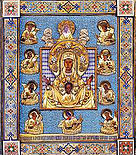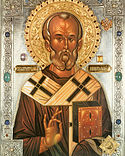Paschal Epistle of Bishop Andrei of Yarraville, Australia and New Zealand
PASCHAL EPISTLE
Beloved in Christ fathers, brothers and sisters,
CHRIST IS RISEN!
“Christ is risen from the dead, trampling down death by death, and on those in the tombs bestowing life.”
We never tire in singing this Paschal hymn – again and again.
But who are “those in the tombs”? – It’s the whole of humanity, because we shall all die, and it’s only a short period of life on earth that separates us from the grave.
Humanity can be compared to an old, big tree with many leaves. Each year, it sheds its leaves – only to be replaced with new ones. Countless generations of humans from the beginning of the world have died and are buried in the ground. The current generation will also go the “way of all the earth” and be supplanted by a new generation. We can see how one after another of our relatives and friends depart from this world: and in turn, we too shall leave this life.
“Christ is risen from the dead, trampling down death by death, and on those in the tombs bestowing life.”
These words are especially comforting to those who have not long to live; for the ailing and dying that are finishing their path. In his Paschal Homily, Saint John Chrysostom exclaims: “Let no one fear death, for the Saviour’s death has set us free. He that was held prisoner of it has annihilated it. By descending into Hell, He made Hell captive… Christ is risen, and not one dead remains in the grave”.
The feast of Pascha is the symbol of eternal, everlasting Pascha; never-ending joy and blessedness. Just as Great Lent serves as a preparation for celebration of Pascha: so must our life on earth serve as the preparation for eternal life.
Now it’s autumn in the Southern hemisphere; but in a spiritual dimension Pascha is Spring. During spring after a cold winter, trees are adorned with leaves and flowers. This is an image of the general resurrection. Through God’s power, the dead will rise from the ground on the day of universal resurrection, and our perishable bodies will become immortal. All of God’s creations will renew and assume a different, incomparably superior appearance.
Like a seed that has been sown in the ground, it has within it that which will come from it; likewise, those traits which are now hidden in the depths of the heart – often unknown even to that person himself – will emerge and become apparent after the universal resurrection.
Good deeds will emerge – self-sacrificial labours, charity, the Gospel’s virtues: meekness, humility, zeal about truth, faith and hope in God. “Then the righteous will shine forth as the sun in the kingdom of their Father.” (Mat. 13:43).
The resurrection of bodies will occur on the last day on earth, but the “spiritual regeneration and resurrection happens every day in our souls. It is bestowed through the Holy Spirit, by Him, Who once died and rose again.” – This is what Simeon the New Theologian teaches.
Passions that reside in our heart, constrain it in captivity to sin. Especially animosity and resentment, which binds the soul as though with hellish chains. However, if we forgive everyone from the heart, the soul then sheds these chains and emerges into freedom. In the Paschal stichera, we sing: “Let us say: Brethren, even to them that hate us, let us forgive everyone for the sake of Resurrection.”
This year, in our Australian Diocese, a joyful event occurred: the Lord has deigned to bring us together, the faithful in Melbourne, Sydney and Brisbane, after being in an artificial division for more than 10 years.
The process of unification and separation, akin to that what happened in 2007, is occurring before our eyes. This current process is no less important because then for many, the unification with Moscow Patriarchate was unacceptable not for so much spiritual, as for ideological motives. Now, the separation and unification is occurring for internal, deeply spiritual reasons – it’s a unification of those who are close to one another in spirit.
The Lord foretold in the Gospel: “Do not think that I have come to bring peace to the earth. I have not come to bring peace, but a sword. For I have come to set a man against his father, and a daughter against her mother, and a daughter-in-law against her mother-in-law.” (Mat. 10: 34-35).
Christians are strangers in this world, “exiles and pilgrims” (1 Peter 2, 11), and the world expels them from its midst. So it will be until the last day of the world, when the final separation will occur at Christ’s Judgment Day.
May the resurrected Lord find us worthy on that day to be on the right side.
“O Christ, great and most holy Pascha. O Wisdom, Word, and Power of God! Grant that we may more perfectly partake of You in the never-ending day of Your kingdom”. (Canon of Pascha, 9th ode)
CHRIST IS RISEN!
Bishop Andrei,
Melbourne, Pascha 2019.

